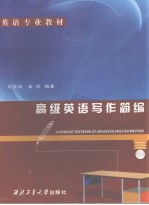

高级英语写作简编 英文PDF电子书下载
- 电子书积分:10 积分如何计算积分?
- 作 者:刘庆松,崔洁编著
- 出 版 社:西安:西北工业大学出版社
- 出版年份:2006
- ISBN:7561220685
- 页数:237 页
Part 1 Introduction 1
1.1 Effective Writing 1
1.2 Demands of the Course 4
1.3 Autobiography 6
Part 2 Reaching Your Audience 10
2.1 Reaching Your Audience 10
2.2 Style,Voice,and Tone 11
2.3 Style Through Vocabulary and Diction 12
2.4 Inappropriate Word Usage 14
Part 3 Polishing Sentences 18
3.1 Sentence Fragments 18
3.2 Sentence Patterns 19
3.3 Precise Vocabulary for Complete Ideas 20
3.4 Symbols That Stand for Errors in an Essay 20
Part 4 Polishing Paragraphs 27
4.1 Paragraph Structure 27
4.2 Topic Sentence 30
4.3 Patterns for Presenting Information 32
4.4 Developing Levels of Specificity 41
4.5 Paragraph Size 42
Part 5 Main Idea and Pattern of Organization 45
5.1 Working Through Early Stages in Forming the Main Idea of the Writing 45
5.2 Knowing Your Goals 46
5.3 Strategies for Generating and Narrowing Main Idea 49
5.4 Methods for Arranging Ideas 51
5.5 Choosing Part of a Larger Topic 55
5.6 Using the Modes 57
Part 6 Gathering Information and Ideas:Memory,Reading and Observation 65
6.1 Gathering Information to Support Main Idea and Pattern of Organization 66
6.2 Strategies for Tapping Memory 66
6.3 Selecting Sources for Reading 70
6.4 Strategies for Observation 72
Part 7 Gathering Information and Ideas:Interviewing 78
7.1 Guidelines for Interviewing 78
7.2 Practicing Interviewing One of Your Teachers 82
7.3 Using Videotapes to Learn Interviewing Techniques 85
Part 8 Elements of Writing Essays 87
8.1 Timeliness 87
8.2 Emotion 90
8.3 Thesis Statement 95
Part 9 Comparison-and-contrast 104
9.1 Elements of Comparison-and-contrast 105
9.2 Keeping Balance 109
9.3 Drawing an Analogy 113
Part 10 Argument 116
10.1 Occasions for Argumentative Essays 116
10.2 Arguing in Context 116
10.3 Stating Your Proposition 117
10.4 Anticipating Opposition 118
10.5 Expanding Your Argument 120
10.6 Three Argumentative Appeals:Reason,Ethics,Emotion 120
10.7 Form:Tradition and Innovation 125
10.8 Arguing for Consensus 127
Part 11 Inductive Reasoning 132
11.1 Generalizing from Data(Induction) 132
11.2 Elements of Induction 133
11.3 Steps in Inductive Reasoning 134
11.4 Guidelines for Inductive Reasoning 135
Part 12 Deductive Reasoning 139
12.1 The Categorical Argument 139
12.2 The Conditional Argument 140
Part 13 Writing a Research Paper 144
13.1 The Nature of Research 144
13.2 Collecting Information 146
13.3 Techniques for Preparing Research-paper Writing 151
Part 14 Procedures in Graduate Study 158
14.1 Doing Research 158
14.2 Becoming Part of the Research Community 170
Part 15 How to Write an Abstract 174
15.1 What Is an Abstract? 174
15.2 Guidelines for Writing an Abstract 175
15.3 Structure of an Abstract 175
15.4 The Style of an Abstract 178
15.5 Commonly Used Sentence Patterns 179
15.6 Key Words 179
Part 16 Quoting and Documenting 181
16.1 Locating the Sources 181
16.2 Introducing a Quotation 182
16.3 When to Use Quotation Marks;When to Document 183
16.4 Format and Punctuation for Quotations 184
Part 17 Composing a Poem 189
17.1 Defining Poetry 189
17.2 Techniques of Composing Poems 192
17.3 Diction 200
17.4 Metre or Meter:Poetry Rhythm 202
17.5 Amateur Poetry as Therapy 204
Appendices 206
1 Writing and Presenting Your Thesis or Dissertation 206
2 Using Modern Language Association(MLA)Format 218
Glossary 231
Bibliography 236
- 《小提琴经典练习曲简编 沃尔法特》丁芷诺,杨宝智 2019
- 《剑桥国际英语写作教程 段落写作》(美)吉尔·辛格尔顿(Jill Shingleton)编著 2019
- 《语文阅读与写作教学研究》李玉红,陈晓玲,王芬著 2018
- 《观察、阅读、写作小学作文整体教学与思维训练》马芯兰主编 2016
- 《剑桥国际英语写作教程 从句子到段落》(美)劳里·布拉斯(Laurie Blass),(美)德德拉·戈登(Deborah Gordon)编著 2019
- 《商务英语写作中批判性同伴反馈教学理论与实践》刘晓庆责任编辑;高现伟 2019
- 《新媒体行业写作与推广108招 打造专业内容,成就企业品牌》陈志红 2019
- 《如何指导博士生学术写作 给导师的教学法》(澳)芭芭拉·凯姆勒(Barbara Kamler),帕特·托马斯(Pat Thomson)著 2020
- 《高考英语自学丛书 概要写作》祝嘉 2018
- 《你只是看上去在陪孩子写作业》王莉著 2019
- 《市政工程基础》杨岚编著 2009
- 《家畜百宝 猪、牛、羊、鸡的综合利用》山西省商业厅组织技术处编著 1959
- 《《道德经》200句》崇贤书院编著 2018
- 《高级英语阅读与听说教程》刘秀梅编著 2019
- 《计算机网络与通信基础》谢雨飞,田启川编著 2019
- 《看图自学吉他弹唱教程》陈飞编著 2019
- 《法语词汇认知联想记忆法》刘莲编著 2020
- 《培智学校义务教育实验教科书教师教学用书 生活适应 二年级 上》人民教育出版社,课程教材研究所,特殊教育课程教材研究中心编著 2019
- 《国家社科基金项目申报规范 技巧与案例 第3版 2020》文传浩,夏宇编著 2019
- 《流体力学》张扬军,彭杰,诸葛伟林编著 2019
